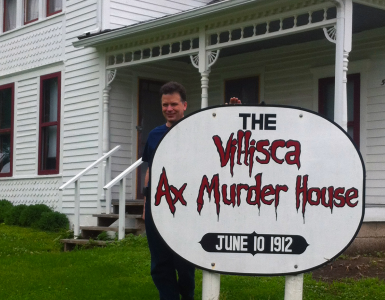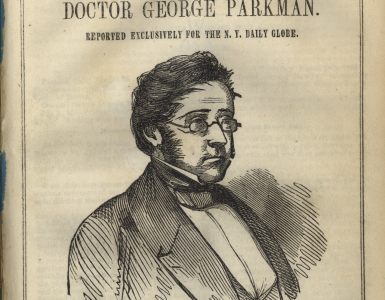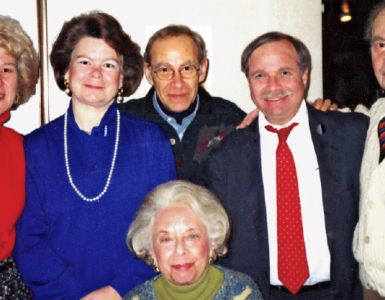by Diana Griffiths
First published in April/May, 2004, Volume 1, Issue 2, The Hatchet: Journal of Lizzie Borden Studies.
Six days prior to Lizzie Borden’s trial, twenty-two year old Bertha Manchester was hacked to death with an axe in her home in Fall River. The killer struck at approximately the same time of day as the Borden murders almost ten months earlier. Bertha’s twenty-three bloody head wounds were counted and described by William A. Dolan, the same Medical Examiner who autopsied Andrew and Abby Borden. And, in spite of evidence to the contrary, there are a number of authors who maintain that the timing of Bertha Manchester’s murder, so close to the trial of Lizzie Borden, may have created reasonable doubt in the minds of jurors and influenced the verdict.
Certainly Lizzie’s good friend, Charles J. Holmes, mounted a valiant effort to create such doubt. He filled multiple newspaper columns comparing the two incidents. He pointed out that both crimes occurred within Fall River’s city limits, wounds were similar in location and number, the assassin appeared to linger at the scene after the murders, the victims were slaughtered in their homes in the morning hours, and valuable items were left undisturbed.
In contrast, the June 1, 1893, edition of The New Bedford Evening Standard focused on the differences between the two cases: Bertha Manchester was a young girl whereas the Bordens were an old couple; Bertha lived in a remote farming area but the Bordens were city dwellers; Bertha was home alone when she was killed yet the Bordens were felled when two other household members were on the premises. And while Bertha’s murder went undiscovered for hours, Andrew Borden’s body was found minutes after his murder.
It seems likely that people living in the Fall River area at the time shared the Evening Standard’s view and did not buy into Mr. Holmes rhetoric. Research shows little indication that those residing in Bristol County in 1893, including Borden jury members, connected the Borden and Manchester murders.
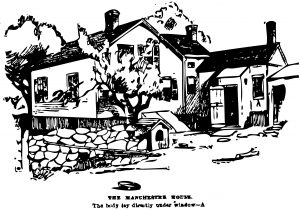 Many citizens interested in the Borden case wrote prosecutor Hosea Knowlton before, during, and after the trial. Yet a voluminous compilation of his correspondence contains only a suggestion of a reference to the Manchester murder. In a May 31, 1893 letter to Knowlton, Dr. F. W. Draper closes with: “I see by the morning papers that killing people with hatchets is a Bristol County habit” (Knowlton Papers 212). The date of the letter indicates his reference is probably to the Manchester murder, but as Draper couches the phrase in such an offhand manner, it is apparent he does not postulate any serious relationship between this murder and the Borden case.
Many citizens interested in the Borden case wrote prosecutor Hosea Knowlton before, during, and after the trial. Yet a voluminous compilation of his correspondence contains only a suggestion of a reference to the Manchester murder. In a May 31, 1893 letter to Knowlton, Dr. F. W. Draper closes with: “I see by the morning papers that killing people with hatchets is a Bristol County habit” (Knowlton Papers 212). The date of the letter indicates his reference is probably to the Manchester murder, but as Draper couches the phrase in such an offhand manner, it is apparent he does not postulate any serious relationship between this murder and the Borden case.
That same year, Edwin H. Porter covered Lizzie Borden’s trial at length in The Fall River Tragedy but makes no mention of the Manchester murder. Victoria Lincoln, who writes from the perspective of a Fall River resident in A Private Disgrace: Lizzie Borden by Daylight, also does not reference Bertha Manchester. And, in his History of Fall River, Arthur Phillips—who assisted with Lizzie’s defense—deals with the Manchester murder as a totally separate issue from the Borden case. Surely, if anyone wanted to connect the two murders, it would be a member of Lizzie’s defense team. It is reported that when news of the Manchester murder broke, Lizzie’s principal counsel, Arthur Jennings joked to the press: “are they going to claim that Lizzie Borden did this too?” (Sullivan 203). But that appears to be his only public reference to the crime. The defense made no further move to connect these two murders.
It was more than 80 years after Lizzie’s trial before a connection was suggested. Published in 1974, Robert Sullivan wrote in Goodbye Lizzie Borden, “Can anyone deny that this coincidence, coming as it did just before the Borden jury was selected, would crush the prosecution, exult the defense, and persuade the jury?” (201). This same sentiment, in various forms, is reiterated by Frank Spiering in 1984, Arnold R. Brown in 1991, Paul Dennis Hoffman in 2000, and Walter Hixson in 2001. Oddly, these five also give the wrong date for the Manchester murder—May 31, 1893. In fact, it occurred one day earlier. But as with so many errors in Borden lore, it seems simply to have been perpetuated by succeeding authors.
Those who suggest the Manchester murder impacted the Borden jury claim jurors were isolated before details about the man accused of Bertha’s murder were published. But an examination of newspaper reports from late May and early June of 1893 show this to be untrue.
The Borden jury was not impaneled and sequestered until Monday, June 5, 1893. Five days previous to this, on May 31, newspapers were already reporting that suspicion in the death of Bertha Manchester had centered on Jose Correiro (alternately known as Manuel Jose Carreiro, Correira, Correia, Correira de Mello), an itinerant Portuguese laborer employed briefly at the Manchester farm.
Then on Saturday, June 3, Correiro was brought into the station house by his uncle. And June 4, the day before the Borden trial opened, Fall River area newspaper headlines screamed that Correiro was “IN JAIL—CHARGED WITH KILLING BERTHA MANCHESTER” (Victorian Vistas 384-85). The accompanying article, along with one appearing in the New York Times on the same day, left little doubt Correiro was the person responsible for the murder. “The authorities are not mincing their words as to the prisoner’s guilt. They say he murdered Bertha Manchester, and they stand ready to prove their assertions” (Victorian Vistas 389).
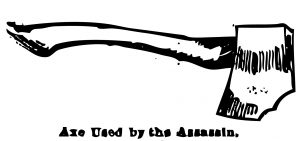 Thus, many of the 145 Bristol County residents turning out for jury selection on Monday, June 5, 1893, were aware Correiro was incarcerated. And if any wondered aloud if the axe-wielding fiend was still at large, they would soon be set straight by their compatriots. News traveled quickly through this community—as indicated by how early that large crowd formed in front of 92 Second Street on the morning of August 4, 1892.
Thus, many of the 145 Bristol County residents turning out for jury selection on Monday, June 5, 1893, were aware Correiro was incarcerated. And if any wondered aloud if the axe-wielding fiend was still at large, they would soon be set straight by their compatriots. News traveled quickly through this community—as indicated by how early that large crowd formed in front of 92 Second Street on the morning of August 4, 1892.
And there was yet another opportunity for the Borden jury to glean information about Correiro on Monday, June 5. Between 5:00–5:30 PM that afternoon, the selected jurors were given a brief recess to meet with friends and make necessary arrangements regarding their upcoming seclusion. Five of the jurors were farmers. Presumably the Manchester case had particular relevance for them and they would welcome the chance to hear more about it. They could learn at this point that Judge John J. McDonough had formally charged Jose Correiro with homicide that very morning.
But—even though the jury knew Jose Correiro was under arrest and charged with the murder of Bertha Manchester—would that preclude them considering him a suspect in the Borden deaths? The key point is not whether the jury knew of Correiro’s arrest—but whether they knew he had not arrived in the United States from the Azores until April of 1893—eight months after the Borden tragedy.
As part of his conspiracy theory in Lizzie Borden: The Legend, the Truth, the Final Chapter, Arnold R. Brown claims authorities knew Correiro had only been in the U.S. for a few months but they suppressed this information until after Lizzie Borden’s trial in order to leave reasonable doubt in the minds of the jury.
Brown’s claim is belied by a news item published four days before the jury was impaneled stating Correiro “came to America from the Western Islands about two months ago. . . .” (New Bedford Evening Standard, June 1, 1893)
So the repeated assertions that the Borden jurors were unaware of the details of Correiro’s arrest are incorrect. Evidence shows that before they were sequestered, the jury could read in the newspapers that the man charged with the Manchester murder was Jose Correiro, he was behind bars, the police were confident he was guilty of the crime—and more importantly—he was not even in the country when the Bordens were killed. Therefore, it seems fair to assume that the similarity and proximity of the murder of Bertha Manchester was never a factor in the jury’s decision to acquit Lizzie Borden.
WORKS CITED
Brown, Arnold R. Lizzie Borden: The Legend, the Truth, the Final Chapter. Nashville, TN: Rutledge Hill Press, 1991.
Burt, Frank H. The Trial of Lizzie A. Borden. Upon an indictment charging her with the murders of Abby Durfee Borden and Andrew Jackson Borden. Before the Superior Court for the County of Bristol. Presiding, C. J. Mason, J.J. Blodgett, and J. J. Dewey. Official stenographic report by Frank H. Burt (New Bedford, MA, 1893, 2 volumes). Created by Harry Widdows for PearTree Press.
Commonwealth of Massachusetts vs. Lizzie A. Borden: The Knowlton Papers, 1892-1893. Eds. Michael Martins and Dennis A. Binette. Fall River, MA: Fall River Historical Society, 1994.
Hixson, Walter L. “Gendered Justice: Lizzie Borden and Victorian America.” Murder, Culture and Injustice: Four Sensational Cases in American History. Akron, OH: U of Akron P, 2001. 18 September 2001 <http://www.uakron.edu/uapress.newtitle.html>.
Hoffman, Paul Dennis. Yesterday in Old Fall River: A Lizzie Borden Companion. Carolina Academic Press, 2000.
Lincoln, Victoria. A Private Disgrace: Lizzie Borden by Daylight. New York: GP Putnam’s Sons, 1967.
Lizzie Borden: Did She? … Or … Didn’t She? As Recorded in the Historic Pages of The Evening Standard, New Bedford, Mass. – 1892 & 1893. Verplanck, NY: Historical Briefs, Inc., 1992.
Phillips, Arthur Sherman. The Phillips History of Fall River, Fascicle III. With additions and interpolations 1941, Privately Printed, Dover Press, Fall River, MA, 1946. 110.
Porter, Edwin H. The Fall River Tragedy. Fall River, MA: George R.H. Buffinton, Press of J.D. Munro, 1893. Rpt. by Robert Flynn. Portland, ME: King Philip Pub., 1985.
Rebello, Leonard. Lizzie Borden: Past and Present. Al-Zach Press, 1999.
Silvia, Phillip T. Jr. ed. Victorian Vistas: Fall River 1886-1900 As Viewed Through its Newspaper Accounts. Fall River, MA: R.E. Smith Printing Co., 1988. 384-387.
Spiering, Frank. Lizzie: The Story of Lizzie Borden. NY: Random House, 1984.
Sullivan, Robert. Goodbye Lizzie Borden. Brattleboro, VT: Stephen Greene Press, 1974.



